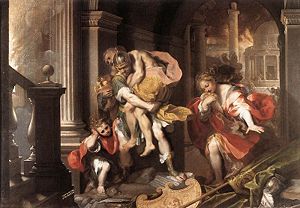Anchises: Difference between revisions
imported>Thomas Wright Sulcer (created) |
imported>Thomas Wright Sulcer m (wikilink fixes, tweaks) |
||
| Line 1: | Line 1: | ||
{{subpages}} | {{subpages}} | ||
'''Anchises''' is the [[father]] of the [[Roman]] [[hero]] [[Aeneas]] and a [[Troy|Trojan]] who has [[sexual intercourse|an affair]] with the [[Greek god|goddess]] [[Venus (goddess)|Venus]] or [[Venus (goddess)|Aphrodite]]. According to [[mythology]], [[Zeus]] was [[anger|angry]] at Aphrodite for causing him to have sex; as a punishment to Aphrodite, Zeus caused her to have sexual relations with a [[human]] which, according to mythology, was beneath the dignity of a goddess. But Anchises was respectful. He realized he had no choice but to submit to the superior power of the goddess, but at the same time, he didn't ask for favors or immortality or any other special privileges, and as a result of his humility and knowing his status as a [[human]], he avoided the [[fate] of many other humans who had relations with gods and goddesses, which was usually [[death]]. Anchises lived | [[Image:BarocciAeneas.jpg|thumb|right|300px|alt=Picture.|Anchises is carried by his strong son and part-god [[Aeneas]] out of the burning city of [[Troy]].]] | ||
'''Anchises''' is the [[father]] of the [[Roman]] [[hero]] [[Aeneas]] and a [[Troy|Trojan]] who has [[sexual intercourse|an affair]] with the [[Greek god|goddess]] [[Venus (goddess)|Venus]] or [[Venus (goddess)|Aphrodite]]. According to [[mythology]], [[Zeus]] was [[anger|angry]] at Aphrodite for causing him to have sex; as a punishment to Aphrodite, Zeus caused her to have sexual relations with a [[human]] which, according to mythology, was beneath the dignity of a goddess. But Anchises was respectful. He realized he had no choice but to submit to the superior power of the goddess, but at the same time, he didn't ask for favors or immortality or any other special privileges, and as a result of his humility and knowing his status as a [[human]], he avoided the [[fate]] of many other humans who had relations with gods and goddesses, which was usually [[death]]. Anchises lived. But after the [[Trojan horse]] strategem by the wily [[Odysseus]] brought about the downfall of the city where he lived, Anchises wanted to stay on, but he was persuaded to listen to his son Aeneas when he saw a vision of a burning circle around his grandson [[Ascanius]]. Accordingly, he let his son [[Aeneas]] carry him out of the burning city of [[Troy]] which was sacked at the end of the [[Trojan War]]. Anchises, according to the ''[[Aeneid]]'' by the [[Roman]] [[poetry|poet]] [[Virgil]], dies on the island of [[Sicily]], and while in the [[Underworld]], is visited by his living son Aeneas and is able to tell his son about the glory of the kingdom of [[Rome]] that Aeneas will found. In the ''Aeneid'', Anchises represents the [[past]], while Aeneas' son [[Ascanius]] represents the [[future]], according to [[Classics]] [[scholar]] [[Elizabeth Vandiver]]. | |||
==References== | ==References== | ||
* see ''Greek mythology'', Teaching Company course, by [[Elizabeth Vandiver]]. | * see ''Greek mythology'', Teaching Company course, by [[Elizabeth Vandiver]]. | ||
Revision as of 05:39, 2 April 2010
Anchises is the father of the Roman hero Aeneas and a Trojan who has an affair with the goddess Venus or Aphrodite. According to mythology, Zeus was angry at Aphrodite for causing him to have sex; as a punishment to Aphrodite, Zeus caused her to have sexual relations with a human which, according to mythology, was beneath the dignity of a goddess. But Anchises was respectful. He realized he had no choice but to submit to the superior power of the goddess, but at the same time, he didn't ask for favors or immortality or any other special privileges, and as a result of his humility and knowing his status as a human, he avoided the fate of many other humans who had relations with gods and goddesses, which was usually death. Anchises lived. But after the Trojan horse strategem by the wily Odysseus brought about the downfall of the city where he lived, Anchises wanted to stay on, but he was persuaded to listen to his son Aeneas when he saw a vision of a burning circle around his grandson Ascanius. Accordingly, he let his son Aeneas carry him out of the burning city of Troy which was sacked at the end of the Trojan War. Anchises, according to the Aeneid by the Roman poet Virgil, dies on the island of Sicily, and while in the Underworld, is visited by his living son Aeneas and is able to tell his son about the glory of the kingdom of Rome that Aeneas will found. In the Aeneid, Anchises represents the past, while Aeneas' son Ascanius represents the future, according to Classics scholar Elizabeth Vandiver.
References
- see Greek mythology, Teaching Company course, by Elizabeth Vandiver.
